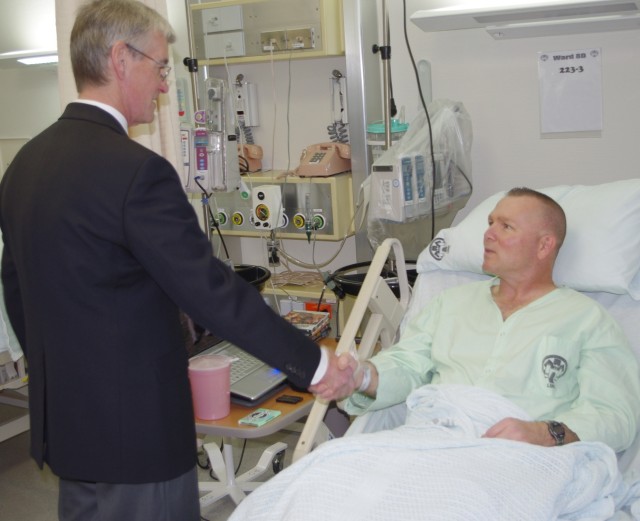PRESIDIO OF MONTEREY, Calif. Aca,!" The medical care provided in Army hospitals and clinics is regarded as among the best in the world and exemplifies the military's commitment to upholding the tenants of the Army Family Covenant.
One of the main initiatives supporting the AFC undertaken by the Army Medical Command is to improve access to care to ensure eligible beneficiaries receive the medical care they have earned and expect from a world-class organization. However, sometimes this means demand for health-care services exceeds the in-house supply, especially when Army medical personnel must also support an Army at war.
In an effort to try to keep customers satisfied and meet the needs of the Army and all beneficiaries, the Army's top medical officer spearheaded an Access to Care campaign.
"I have directed all of our medical treatment facility commanders to make access to care one of their top priorities," said Lt. Gen. Eric B. Schoomaker, Army Surgeon General and commander of MEDCOM. "Our goal is to have the right provider providing care at the right time, using the right venue."
Access to care is incorporated as a major objective of the Presidio of Monterey Army Health Clinic's Balanced Score Card, the management tool used to establish goals and measure accomplishments in the organization.
Additionally, access to care is part of MEDCOM's organizational inspection program; and the clinic, known as POMAHC, has been given specific recommendations for process improvements.
Factors that challenge access to care at POMAHC include requirements to deploy military medical personnel in support of Operation Iraqi Freedom and Operation Enduring Freedom, pre- and post-deployment care needed by Soldiers, readiness requirements, and, because POMAHC is an "active duty only clinic," dependence on enrollment in TRICARE beyond the facility's ability to provide timely care.
POMAHC leaders have hired and are in the process of hiring more health-care providers, examining TRICARE Prime enrollments to ensure the clinic does not enroll more beneficiaries than the facility can care for within access standards, and educating medical personnel and beneficiaries about access policies and standards.
Over the last few years, the Army has added over 500 primary-care providers (including military personnel, civilian employees and contractors), more than 270 behavioral-health providers and increased the network of civilian health-care providers available to augment the military health-care system when it cannot meet patient needs in a timely manner.
The Department of Defense has established standards for the time a patient may wait to see a provider, ranging from 24 hours for acute care to 28 days for a specialty or wellness appointment. POMAHC adheres to the policy that states "a patient will be offered an appointment through the TRICARE network if the (military treatment facility) cannot meet these standards."
The entire staff at POMAHC understands that beneficiaries want greater access to the health care they have earned and are committed to taking the steps necessary to make improvements, determined to see that patients get the right care, at the right time and in the right place.
(Editor's note: Jerry Harben contributed to this article.)


Social Sharing